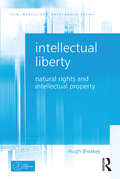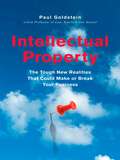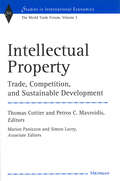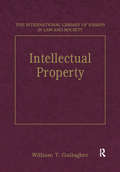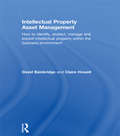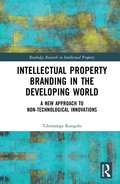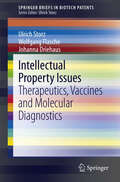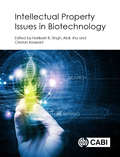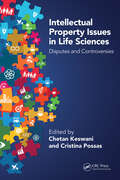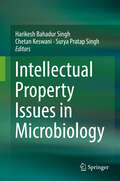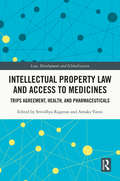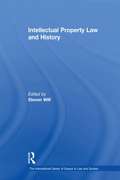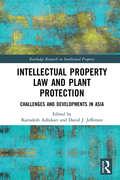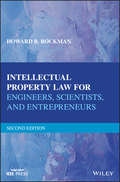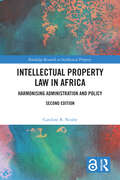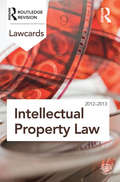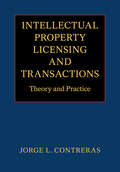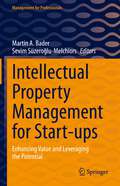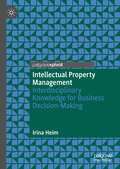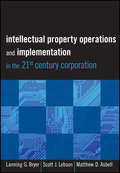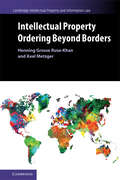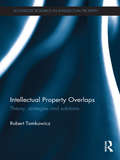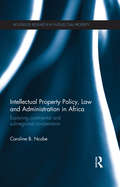- Table View
- List View
Intellectual Liberty: Natural Rights and Intellectual Property (Law, Ethics And Governance Ser.)
by Hugh BreakeyConsidering the steady increase in intellectual property rights in the last century, does it make sense to speak of ’user’s rights’ and can limitations on intellectual liberty be justified from a rights-based perspective? This book philosophically defends the importance of the public domain and user’s rights through the use of natural-rights thought. Utilizing primarily the work of John Locke, it contends that considerations of natural justice and human freedom impose powerful constraints on the proper reach and substance of intellectual property rights, especially copyright. It investigates both the internal and external natural-rights constraints on intellectual property, and argues in particular for the importance to human freedom of the right to intellectual liberty - the right to inform one’s actions by learning about the world. It concludes that respect for fundamental freedom-based interests require a balanced approach to the scope, strength and duration of intellectual property rights.
Intellectual Property
by Paul GoldsteinThis book is the first detailed historical account of intellectual property law. In part, it examines why intellectual property law with its subcategories of patents, copyright, designs and trade marks took the shape that it did over the course of the nineteenth century. In addition the authors deal with ways in which the law grants property status to intangibles and describe how the law came to create techniques that enabled it to recognize protectable intangibles, and the inescapable problems that have arisen from their use.
Intellectual Property
by Thomas Cottier Petros C. MavroidisThe incorporation of intellectual property protection into the WTO international trading system has been a milestone in international economic law and has added a new dimension to trade regulation — new rights and obligations and new challenges alike. The contributors, leading scholars and practitioners in the field, provide insights into the legal relationship of the TRIPs Agreement to the GATT 94 and the GATS. The book widens the debate with a thorough discussion on pending and unresolved relations of TRIPs, the WTO, UPOV, the Convention on Biodiversity and Farmers' Rights contained in the FAO International Undertaking, and efforts of the World Bank GCIAR system, including IPGRI. What will be the impact of TRIPs on ownership of plant genetic resources? Largely a victory for OECD countries, the present state of intellectual property rights has important implications for developing countries. The incorporation of intellectual property rights into the WTO system will eventually change the relationship of trade, competition, and intellectual property. It will equally have to assist in providing equitable sharing of benefits in the use of plant genetic resources. All of these issues are essential for the revision of exclusions from patenting in TRIPs. This volume offers insights into how this difficult task could and should be approached in a balanced manner and will be essential reading for economists and trade and intellectual property lawyers interested in the subject. Moreover, the volume will be relevant to agricultural economists as it addresses complex problems in the interstices of trade, intellectual property, plant genetic resources, and sustainable development.
Intellectual Property (The International Library of Essays in Law and Society)
by William T. GallagherThis book brings together articles by leading international scholars from diverse disciplinary perspectives who focus on the legal, social and cultural dimensions of intellectual properties - including patents, copyrights, trademarks, trade secrets and rights of publicity. These articles employ a creatively eclectic approach to the study of intellectual property law and policy viewed through the lenses of traditional doctrinal analysis, historical perspectives, critical cultural study, and empirical examinations of intellectual property in action. The volume also directs critical attention to the significance of intellectual property in contemporary processes of globalization and political economy.
Intellectual Property Asset Management: How to identify, protect, manage and exploit intellectual property within the business environment
by David Bainbridge Claire HowellIn the new ‘knowledge-intensive economies’ Intellectual assets increasingly play a key part on balance sheets. There is an increasing global awareness that in order to promote innovation and the growth of the economy, businesses must fully recognise and exploit their intellectual assets. A company’s ability to innovate rapidly and successfully is now regarded as essential and most breakthroughs are made by Small and Medium-sized Enterprises (SMEs), usually with no in-house legal professionals to help them. It is essential that those working with or creating intellectual property rights (IPR) are aware of the basics of Intellectual Property Law. Intellectual Property Asset Management provides business and management students at all levels with an accessible-straight-forward explanation of what the main Intellectual Property rights are and how these rights are protected. Locating the subject squarely in a business context and using case studies and examples throughout drawn from a wide range of business organisations, it explains how an organisation can exploit their rights through licensing, franchising and other means in order to make the best possible use of their IP assets. This book will provide students with:• the basic Intellectual Property law knowledge needed to identify a potential IP issue• the tools and understanding to assess an IP breach• the ability to identify where the problem cannot be solved in house and where expert legal assistance is required • the knowledge required to work effectively with lawyers and other legal professionals to achieve the desired outcome
Intellectual Property Branding in the Developing World: A New Approach to Non-Technological Innovations (Routledge Research in Intellectual Property)
by Tshimanga KongoloIntellectual Property Branding in the Developing World identifies success stories in the areas of intellectual property (IP) and branding for non-technological innovation in the developing world. The author examines the relationship between IP, branding and innovation to demonstrate that innovation, in general, and non-technological innovation, in particular, must go hand in hand with branding. Branding of non-technological innovations should be a good strategic tool to be used by countries in the developing world mainly in the areas where they have competitive advantages. This book will assist scholars and academics dealing with innovation, branding, and IP issues, providing context and guidance to policymakers from the developing world. It is also relevant to researchers and students in the fields of intellectual property law, commercial law, international law, management, and innovation.
Intellectual Property Issues
by Ulrich Storz Johanna Driehaus Wolfgang FlascheSpringerBriefs in Biotech Patents present timely reports of intellectual properties (IP) issues and patent aspects in the field of biotechnology. This new volume in the series focuses on the particular IP issues of therapeutics, vaccines and molecular diagnostics. The first chapter concentrates on basics principles for protecting antibody compounds. Additional ways to create follow-up protection for antibody therapeutics are also discussed. The second chapter gives an overview of the patent landscape in molecular diagnostics, and discusses issues of patentability with respect to the different technologies and compounds used therein. The third chapter gives a broad overview of areas of law that are particularly relevant to the patenting of peptide vaccines and therapeutic peptides as products and in compositions. The scope of patentable subject matter is discussed, as it has been the focus of much wrangling and debate in the courts.
Intellectual Property Issues in Biotechnology
by Alok Jha Harikesh B. Singh Chetan KeswaniAdopting a unique approach, and with case studies and examples from developing economy markets, this book integrates science and business to provide an introduction and an insider view of intellectual property issues within the biotech industry. Broad in scope, the book covers key principles in pharmaceutical, industrial and agricultural biotechnology within four sections. The first section details the principles of intellectual property and biotechnology, the second section covers plant biotechnology, including biotic and abiotic stress tolerance, GM foods in sustainable agriculture, microbial biodiversity and bioprospecting for improving crop health and productivity, and production and regulatory requirements of biopesticides and biofertilizers. The third section describes recent advances in industrial biotechnology, such as DNA patenting, and commercial viability of the CRISPR/Cas9 system in genome editing. The final section describes intellectual property issues in drug discovery and development personalized medicine, and vaccines in biodefense.
Intellectual Property Issues in Life Sciences: Disputes and Controversies
by Chetan Keswani Cristina PossasIntellectual Property Issues in Life Sciences: Disputes and Controversies highlights emerging legal, social, and regulatory issues pertaining to various areas of life sciences. Patents occupy a prominent position in the innovation systems in the life sciences, but to what extent they support, or hinder innovation is widely disputed. Life science is a broad subject including agriculture, ecology, microbiology, plant and animal sciences, health and diseases, biotechnology, etc. However, despite the broad applications of biotechnology and molecular biology techniques, profits on investments are surprisingly low. Thus, it is vitally important for universities, public research organizations, and private enterprises to protect their innovations. There are vast differences of opinion on patentability of living organisms, which are largely barred from patent protection. However, mind-sets are rapidly shifting and IP issues in life sciences are receiving increasing attention. To compete with progressive bio-based economies the developing countries are amending their IP laws to encourage investment.An effort has been made to avoid considering policy in isolation, but rather to emphasize the interplay between the policy mix, the wider institutional setting, market forces, and system organization solutions. Both empirical and conceptual chapters are included to bring them together and to yield facts and interpretations for the readers.This book presents expert opinions by frontier academicians, researchers, and attorneys on the recent challenges in the rapidly evolving life science industry. The present book offers comprehensive knowledge on the contemporary issues in life sciences to a wide range of audiences including students, scholars, researchers, legal practitioners, policymakers, and others interested in emerging intellectual property issues.Features The only compilation available on the contemporary intellectual property issues in life sciences in the post-COVID era. Focuses on the commercial, regulatory, bioethical, and socio-legal implications of patents in life sciences. Describes an integrated approach for sustained innovations in various areas of life sciences. Discusses the recent IP controversies in a pan-global context. Presents viewpoints to front-line practitioners, viz attorneys, researchers, etc.
Intellectual Property Issues in Microbiology
by Harikesh Bahadur Singh Chetan Keswani Surya Pratap SinghIn the current era current era of significant innovations, science and technology are powerful tools improving human welfare through prosperity and sustainable development. The development of microbiology based industries in any given country is shaped by the characteristics of its technology—particularly its close relation to scientific knowledge, and by country-specific factors such as the level and nature of the scientific knowledge base, the institutional set-up, and the role assumed by the government, all of which influence the country's ability to exploit the new opportunities.This unique book presents an integrated approach for sustained innovation in various areas of microbiology. Focusing on the industrial and socio-legal implications of IPR in microbiological advances, it offers a comprehensive overview not only of the implications of IPR in omics-based research but also of the ethical and intellectual standards and how these can be developed for sustained innovation.The book is divided into three sections discussing current advances in microbiological innovations, recent intellectual property issues in agricultural, and pharmaceutical microbiology respectively. Integrating science and business, it offers a glimpse behind the scenes of the microbiology industry, and provides a detailed analysis of the foundations of the present day industry for students and professionals alike.
Intellectual Property Law and Access to Medicines: TRIPS Agreement, Health, and Pharmaceuticals (Law, Development and Globalization)
by Srividhya RagavanThe history of patent harmonization is a story of dynamic actors, whose interactions with established structures shaped the patent regime. From the inception of the trade regime to include intellectual property (IP) rights to the present, this book documents the role of different sets of actors – states, transnational business corporations, or civil society groups – and their influence on the structures – such as national and international agreements, organizations, and private entities – that have caused changes to healthcare and access to medication. Presenting the debates over patents, trade, and the Agreement on Trade-Related Aspects of Intellectual Property Rights (TRIPS Agreement), as it galvanized non-state and nonbusiness actors, the book highlights how an alternative framing and understanding of pharmaceutical patent rights emerged: as a public issue, instead of a trade or IP issue. The book thus offers an important analysis of the legal and political dynamics through which the contest for access to lifesaving medication has been, and will continue to be, fought. In addition to academics working in the areas of international law, development, and public health, this book will also be of interest to policy makers, state actors, and others with relevant concerns working in nongovernmental and international organizations.
Intellectual Property Law and History (The\international Library Of Essays In Law And Society Ser.)
by Steven WilfIntellectual property has become a dominant feature of our knowledge based economy in recent years, but how has property rights in intangible items developed? This book brings together for the first time exemplary scholarship with diverse approaches to the history of United States intellectual property protection, including trade secrets, trademark, copyright, and patent law. These articles, written by leading experts in the field and often challenging conventional narratives, underscore the importance of historical perspectives for understanding how an extensive, evolving framework for the regulation of knowledge emerged in the modern period. By tracing intellectual property from an historical perspective - not merely providing justifications in philosophy or economics in the abstract - this book draws upon the past to address contemporary debates over such varied topics as: access to knowledge; policing copyright infringement; whether employees should own the products of their minds; the role of national borders in an age of digital information; and the very future of intellectual property as stakeholders and consumers contest the extent of its legal protection.
Intellectual Property Law and Plant Protection: Challenges and Developments in Asia (Routledge Research in Intellectual Property)
by Kamalesh Adhikari David J. JeffersonThis book is the first to provide a detailed and critical account of the emergence, development, and implementation of plant variety protection laws in Asian countries. Each chapter undertakes a critical socio-legal analysis of one or more legal frameworks to understand, evaluate, and explore the concerns of diverse national stakeholders, the histories and dynamics of law-making, and the ways in which plant variety protection and seed certification laws interact with local agricultural systems. The book also assesses how Asian countries can capitalise on the ‘unused policy space’ in international agreements such as the Agreement on Trade-Related Aspects of Intellectual Property Rights and the International Convention for the Protection of New Varieties of Plants, as well as international obligations beyond these, such as those contained in the Convention on Biological Diversity and the Plant Treaty. It also highlights the many ways in which Asian experiences can offer new insights into the relationship between intellectual property and plants, and how relevant laws might be re-imagined in other regions, including Africa, Europe, and the Americas. By adding an important new perspective to the ongoing debate on intellectual property and plants, this book will appeal to academics, practitioners, and policy-makers engaged in work surrounding intellectual property laws, agricultural biodiversity, and plant breeding.
Intellectual Property Law for Engineers, Scientists, and Entrepreneurs
by Howard RockmanFully revised new edition that completely covers intellectual property law—and many related issues—for engineers, scientists, and entrepreneurs This book informs engineering and science students, technology professionals, and entrepreneurs about the intellectual property laws that are important in their careers. It covers all of the major areas of intellectual property development and protection in non-legalistic terms that are understandable to technology and science professionals. New material includes a comprehensive discussion on the American Invents Act (AIA), coverage of many new high-profile topics, such as patent protection the mobile communications industry, and a new chapter on "The Future of Technology, Engineering, and Intellectual Property." Now in its second edition, Intellectual Property Law for Engineers, Scientists, and Entrepreneurs enables inventors and creators to efficiently interface with an intellectual property attorney in order to obtain the maximum protection for their invention or creation, and to take steps to ensure that that invention or creation does not infringe upon the intellectual property rights of others. It includes patent, trade secret, mask work, and cybersquatting legal and procedural principles. The book also shows readers how to properly use new vehicles of intellectual property protection for novel software, biotech, and business method inventions. Additionally, it examines trademark protection for domain names, and other ancillary matters that fall within the genre of intellectual property protection. This informative text: Covers all of the major areas of intellectual property development and protection in clear, layman’s terms so as to be easily understood by technology and science professionals Provides detailed outlines of patent, trademark, copyright, and unfair competition laws Offers essays on famous and noteworthy inventors and their inventions—and features a copy of the first page of patents resulting from these inventors’ efforts Covers many new high-profile cases covering patent protection within the mobile communications industry Intellectual Property Law for Engineers, Scientists, and Entrepreneurs, Second Edition is an excellent text for graduate and undergraduate engineering students, as well as professionals and those starting a new technology business who need to know all the laws concerning their inventions and creations.
Intellectual Property Law in Africa: Harmonising Administration and Policy (Routledge Research in Intellectual Property)
by Caroline B. NcubeExamining the harmonisation of Intellectual Property policy, law and administration in Africa, this book evaluates the effectiveness of efforts to establish continental Intellectual Property institutions and frameworks. It also considers sub-regional initiatives led by the regional economic communities and the regional Intellectual Property organisations, focusing on relevant protocols and agreements that address Intellectual Property as well as the implementing institutions. The book assesses the progress of such initiatives with particular reference to the current socio-economic status of African states. It argues that that harmonisation initiatives need to be crafted in a way that is supportive of the developmental goals of African states and advocates for due consideration of individual states’ unique conditions and aspirations. This book will be of great relevance to scholars and policy makers with an interest in Intellectual Property law and its harmonisation in Africa.
Intellectual Property Lawcards 2012-2013 (Lawcards)
by RoutledgeRoutledge Lawcards are your complete, pocket-sized guides to key examinable areas of the undergraduate law curriculum and the CPE/GDL. Their concise text, user-friendly layout and compact format make them an ideal revision aid. Helping you to identify, understand and commit to memory the salient points of each area of the law, shouldn’t you make Routledge Lawcards your essential revision companions? Fully updated and revised with all the most important recent legal developments, Routledge Lawcards are packed with features: Revision checklists help you to consolidate the key issues within each topic Colour coded highlighting really makes cases and legislation stand out Full tables of cases and legislation make for easy reference Boxed case notes pick out the cases that are most likely to come up in exams Diagrams and flowcharts clarify and condense complex and important topics '...an excellent starting point for any enthusiastic reviser. The books are concise and get right down to the nitty-gritty of each topic.' - Lex Magazine Routledge Lawcards are supported by a Companion Website offering: Flashcard glossaries allowing you to test your understanding of key terms and definitions Multiple Choice Questions to test and consolidate your revision of each chapter Advice and tips to help you better plan your revision and prepare for your exams Titles in the Series: Commercial Law; Company Law; Constitutional Law; Contract Law; Criminal Law; Employment Law; English Legal System; European Union Law; Evidence; Equity and Trusts; Family Law; Human Rights; Intellectual Property Law; Jurisprudence; Land Law; Tort Law
Intellectual Property Licensing and Transactions: Theory and Practice
by Jorge L. ContrerasIntellectual property transactions underlie large segments of the global economy, from pharmaceuticals to computing, entertainment to digital content. This first-of-its-kind resource combines practical contract drafting and negotiation skills with substantive legal doctrine in the rapidly growing area of intellectual property transactions and licensing. Though primarily designed for classroom use, it is also a must-have legal reference work for every lawyer involved in the technology, biopharma, entertainment, media or financial services industries. It includes practical drafting models and explanations of key contractual provisions such as field of use, exclusivity, milestones, royalties, termination, indemnification and liability, and combines these with discussion of the latest cases interpreting these provisions. Numerous legal doctrines that affect the enforcement of IP agreements are also covered, including exhaustion, first sale, misuse, estoppel, antitrust and bankruptcy law, as well as chapters focusing on specialized fields such as trademark law, music licensing, technical standardization, and IP pooling. This book is also available as Open Access on Cambridge Core.
Intellectual Property Management for Start-ups: Enhancing Value and Leveraging the Potential (Management for Professionals)
by Martin A. Bader Sevim Süzeroğlu-MelchiorsThis book examines intellectual property (IP) as an important value driver for start-ups. Businesses of all sizes are inevitably confronted with intellectual property issues at some point, but start-ups and their collaborators face unique challenges and opportunities in IP management. Identifying, generating, and exploiting intellectual property can lead to sustainable competitive advantages and avoidance of risks. Many start-ups sense the complexity of IP management and therefore place their energy elsewhere. However, the clear conclusion to be drawn from this unique collection of contributions is that putting an IP management strategy in place is critical to the successful development of a business. Prof. Dr. Martin A. Bader and Prof. Dr. Sevim Süzeroğlu-Melchiors have years of experience as consultants, entrepreneurs, business owners, and researchers where they saw firsthand the need for a comprehensive yet practical resource for start-ups and their key stakeholders.This book explores different perspectives in dealing with IP from six different angles: the start-up’s view, the investor’s view, the corporation’s view, the university’s view, the global IP office’s view, and the advisor’s view. Each section consists of chapters written by leading experts from around the globe including Silicon Valley, Canada, Israel, Switzerland, Germany, Finland, France, Australia, Brazil, India, Japan, Singapore, and South Africa. Contributors bring practical experience from a wide range of sectors, such as information and communication technology, software, artificial intelligence, machine learning, cybersecurity, industrial automation, internet of things, life sciences, pharma, crop science, biotech, medtech, mining, sustainability, climate tech, and even quantum technologies. This timely publication serves as a guidebook for entrepreneurs and other key stakeholders in the start-up ecosystem. It empowers founders to develop their own IP management strategy to mitigate risk, create and capture value, and lay the groundwork for sustainable growth. An essential reference for start-ups to achieve business excellence.“This edited book volume offers valuable insights, bringing together perspectives of key stakeholder groups from a wide variety of innovation ecosystems – an invaluable resource.” —Carsten Fink, Chief Economist, World Intellectual Property Organization, Geneva“A timely book for those wanting a clear overview of the issues the different players encounter in the start-up ecosystem. A useful resource indeed. Congratulations to the editors and team.”—Audrey Yap, Managing Partner YUSARN AUDREY LLC, Past President LESI, Chairman Singapore Innovation & Productivity Institute, Singapore“A ‘must read’ for all innovators in the start-up world. It is truly a fantastic book and one I would recommend being bought and read (in full)!”—Laurence Freeman, Professor (Adjunct), CU Denver Business School, Jake Jabs Center for Entrepreneurship, Denver, Colorado, United States
Intellectual Property Management: A Guide for Scientists, Engineers, Financiers, and Managers
by Claas Junghans Adam LevyThis concise introduction to European patent law and global patent perspectives combines the legal and economic perspectives to adopt a unique approach that serves both inventors -- engineers and scientists -- as well as financiers and economists. Written by experts with first-hand knowledge this book is completely up-to-date, taking into account recent additions to European patent law, especially in the field of biotechnology and genetics. While concentrating on the EU, the world perspective is nevertheless represented, including US particularities. The result is a set of guidelines allowing readers to develop a holistic patent strategy suitable for their specific needs. For scientists, engineers, managers and financiers in the chemical industry.
Intellectual Property Management: Interdisciplinary Knowledge for Business Decision-Making
by Irina HeimAn understanding of intellectual property is an essential component of management and business strategy in many industries. It can be used to generate value and create competitive advantage and goes hand-in-hand with the study of technology innovation and international business. However, the literature on intellectual property has been dominated by writers with backgrounds in legal science and economics. This book advocates an interdisciplinary view on intellectual property management for business and management students and professionals. It provides an outline of the field in terms that are tailored to management scholarship and with an emphasis on business decision making. It is intended for business school students of intellectual property management, innovation, strategic management and industry studies, as well as professionals in need of an accessible and business-minded approach to intellectual property management.
Intellectual Property Operations and Implementation in the 21st Century Corporation
by Lanning G. Bryer Scott J. Lebson Matthew D. AsbellA practical approach to corporate IP operations and implementation Intellectual Property Operations and Implementation helps executives, attorneys, accountants, managers, and owners, understand the legal, technological, economic, and cultural changes that have affected corporate IP ownership and management. Page by page, it provides practical examples and advice from seasoned and enduring professionals who have adopted new and streamlined methods and practices whether as in-house or outside counsel, or service providers. Timely and relevant in view of the substantially global economic recession amidst rampant technological development and the resulting changes in law, practice, and culture Examines the decision making processes, activities, and changes of significant corporate intellectual property owners in today's new economy Important and timely, this book provides a global approach to corporate IP management.
Intellectual Property Ordering beyond Borders (Cambridge Intellectual Property and Information Law)
by Axel Metzger Ruse-Khan, Henning GrosseDuring the past century, intellectual property (IP) law has expanded within and beyond national borders. The field of IP law was once a niche area concerning authors, inventors, and trademark owners. Today, IP law acts as a complex regime of instruments, institutions, and actors that negotiate overlapping, diverging, and occasionally competing public policies on a global scale. As IP continues to expand beyond borders, the instruments and tools utilised for its global protection rely on public international law as the common denominator and unifying frame. Intellectual Property Ordering Beyond Borders provides an evaluation of the most pertinent public international law questions raised by this multidimensional expansion. This comprehensive and far-reaching volume tackles problems such as generalist approaches under the law of treaties; custom and general principles; interfaces between IP and other normative orders, such as trade and investment; and interdisciplinary accounts from the economic, political, and social science perspectives. This title is also available as open access on Cambridge Core.
Intellectual Property Overlaps: Theory, Strategies, and Solutions (Routledge Research in Intellectual Property)
by Robert TomkowiczIntellectual property rights and their overlaps are considered in light of rights purposes, relying on the concept of a balance of rights as the measuring rod for assessment of the consequences resulting from the exercise of overlapping rights. Identifying the complex interface between different types of intellectual property rights, this book discusses the use of these rights and their effect on a diverse group of stakeholders, from individual users of e-books to large corporations operating search engines on the internet.The book suggests solutions to potentially objectionable uses of overlapping rights in an attempt to provide judiciary and law practitioners with an analytical framework for resolving disputes of overlaps in the intellectual property system. In doing so, the author investigates how use of intellectual property rights associated with one segment of the system can affect the carefully crafted balance of rights held by various stakeholders in an overlapping segment. In particular, the book suggests that a properly construed doctrine of misuse of intellectual property rights would provide an adequate response to the challenge posed by improper use of overlapping intellectual propertyrights.This book is of particular interest to law practitioners, managers in advanced technology and media industries, academics, and university students who work with or analyze intellectual property and new technologies.
Intellectual Property Policy, Law and Administration in Africa: Exploring Continental and Sub-regional Co-operation (Routledge Research in Intellectual Property)
by Caroline B. NcubeThis book examines the harmonisation of Intellectual Property (IP) policy, law and administration in Africa. Two recent developments have brought this topic to the fore. The first is the escalation of long-standing efforts to establish a Pan-African Intellectual Property Organisation (PAIPO), a continental initiative. The second is the current sub-regional attempt to operationalise the IP provisions of the Southern African Development Community (SADC)’s Protocol on Trade (articles 9b and 24) and its Protocol on Science, Technology and Innovation (article 2m). Intellectual Property Policy, Law and Administration in Africa discusses the viability of such initiatives with particular reference to the current socio-economic status of Africa’s nations. With a view to contributing to future developments in Africa at both a continental and sub-regional level, the author considers this issue through the lens of advancing the public interest in IP. Ncube argues that harmonisation initiatives ought to be crafted in a way that is supportive of the development aspirations of African states. Consequently, she urges due consideration of individual states’ unique conditions and aspirations in any harmonisation venture, a necessity outlined in article 7 of the Agreement on Trade Related Aspects of Intellectual Property Rights. This book will be of great relevance to scholars and policy makers with an interest in IP law and African law in general.
Intellectual Property Protection for AI-generated Creations: Europe, United States, Australia and Japan
by Ana RamalhoThis book explores the intersection between artificial intelligence and two intellectual property rights: copyright and patents. The increasing use of artificial intelligence for generating creative and innovative output has an impact on copyright and patent laws around the world. The book aims to map and analyse that impact. The author considers how artificial intelligence systems may aid, or in some cases substitute for, human creators and inventors in the creative process. It is from this angle that the copyright and patent regimes in four jurisdictions (Europe, the United States, Australia and Japan) are investigated in depth. The author describes how these jurisdictions look at works and inventions generated through a process where artificial intelligence is present or prevalent, and examines how copyright and patent regimes should adapt to the reality of artificially intelligent creators and inventors.As the use of artificial intelligence to generate creative and innovative products becomes more common, this book will be a valuable resource to researchers, academics and policy makers alike.
